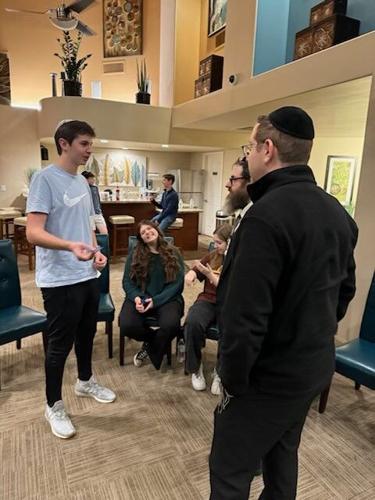Trader Joe’s chili and lime-flavored rolled corn tortilla chips likely got a sales boost in 2022 after Jew-Tok (@.jewtok), a popular purveyor of young Orthodox Jewish culture on the social media site TikTok, released a video of college-aged influencer Avichai Cohen explaining why the chips are a good kosher substitute for Takis, a beloved campus snack that is not certified kosher.
After reading the ingredient list on a Takis’ bag, which Cohen likes “because the smell is amazing,” the young influencer discovered that the Trader Joe’s chips had the same ingredients with the added benefit of being kosher. He took a chip from the bag and, after saying a blessing, took a bite and declared, “Wow! Those are good!”
Cohen pointed to a symbol on the front of the bag, a capital letter “U” inside an “O,” which denotes the product is certified kosher by the Orthodox Union (OU). Below the video are several questions and back-and-forth discussions from followers about what is and isn’t kosher and why.
That video has more than 200,000 likes, and while some people might chuckle at the idea of hordes of young people wandering into the weeds of kosher certification and its vicissitudes, it’s not at all surprising to more than a few Orthodox teens (and probably adults) in Greater Phoenix, as evidenced by the questions they had for OU Kosher rabbis who were in Arizona last month to provide kosher education to the local Jewish community.
Laili Schnitzer, Phoenix director for Arizona NCSY (OU’s youth organization) and Jewish Student Union (its public school counterpart), took about a dozen enthusiastic teens to meet with the rabbis. One of the first questions was about Takis vs. Trader Joe’s corn chips.

Arizona NCSY teens meet with Orthodox Union Kosher rabbis to ask questions about Takis, Oreos and more.
OU Kosher Rabbinic Coordinator Rabbi Eli Eleff was not at all surprised. He explained that a brand might not seek OU’s kosher certification for various reasons — money, lack of equipment or manpower, etc. One big reason is simply that a company might not be aware of the value of a kosher certification. He told the kids that they had power as consumers and should “call up Takis and ask for it.” Certain companies have let their certification go only to renew it after hundreds of customers called to request it.
Rabbi Yisroel Isaacs, Phoenix’s Beth Joseph Congregation’s senior rabbi and director of the Greater Phoenix Vaad Hakashruth, invited Eleff and his colleagues, Rabbi Moshe Elefant, OU Kosher’s COO and Rabbi Chaim Goldberg, OU Kosher rabbinic coordinator, to educate the Greater Phoenix Jewish community about their work and the processes involved. Chabad of Arizona and Arizona Kosher co-sponsored the Beth Joseph event, “Backstage with OU Kosher,” on Wednesday, Feb. 21. About 130 people turned out for the program and attendees represented various levels of kosher adherence, Isaacs told Jewish News.

Rabbi Moshe Elefant, OU Kosher COO, spoke at Congregation Beth Joseph’s community gathering on Wednesday, Feb. 21.
“It was an amazing event that exceeded my expectations. It was informative, entertaining, fun and it appealed to a broad audience with different interests,” Isaacs said.
Over the last decade, the local Vaad has developed a close working relationship with OU, not only as professional advisors for the Vaad’s kosher supervision work, but Isaacs and his colleagues also assist the OU in managing supervision in different facilities around the state that certify things as kosher, he said. Isaacs was at the OU headquarters in New York a few months ago to coordinate and collaborate with various leaders, and the visit to Phoenix is “a natural outgrowth of a deepening relationship.”
As representatives of the largest kosher agency in the United States, Eleff said he and his colleagues have “a mandate and mission” to educate the Jewish community about what they do. Even those who have kept kosher since childhood don’t always have a grasp on what it takes to get an OU certification.

Rabbi Chaim Goldberg, OU Kosher rabbinic coordinator, speaking on the halachos of kashrus at the Yeshiva of Scottsdale.
“People don’t understand what goes on behind the scenes. It’s not just a rabbi blessing food. It’s very technical and can seem sort of like going into Willy Wonka’s chocolate factory,” Eleff told Jewish News.
Goldberg gave a hands-on demonstration with fish purchased at Whole Foods. He let people examine it to identify the scales while he talked about what the Torah has to say on the topic, as well as what kind of issues arise when one wants to eat sushi or other seafood dishes.
“He was hilarious and took questions about certifying marijuana products and ‘What’s the deal with Oreo cookies? Are they really dairy?’” Eleff said. It’s a question they’ve received a lot.
Ancient laws don’t easily apply to modern food production, with diverse equipment and factories filled with different items, many of which are non-kosher or at least non-pareve. In the case of Oreos, the certification specifies dairy even though the product isn’t actually made with dairy products.

Rabbi Eli Eleff, OU Kosher rabbinic coordinator, speaking at the Yeshiva of Arizona.
There are a couple of things going on in that case, he explained. First, some of the equipment that makes the cookies also makes other dairy products and thus can’t be pareve. Second, if there is ever a need to tweak the recipe to include some dairy in the cookie, the company won’t have to reapply for a new certification, a process that takes time and expense.
Isaacs said Elefant “was kind of a highlight,” in terms of entertaining the audience. People were especially rapt listening to him talk about the kosher prospects of Skittles. While most chocolate and candy products now have OU kosher certification, “the last frontier is getting Skittles across the finish line,” which might be getting closer, he said.
The OU experts also met with students at Shearim Torah High School, Beis Chana High School, Yeshiva of Scottsdale, Yeshiva High School of Arizona and the Tucson Torah Center, where they gave Kosher 101 presentations.
“It’s important to get into the community and meet students, the next leaders and kosher consumers,” Eleff said. The students asked many questions and at each school they went over their time allotment to answer them.
Schnitzer’s group met with the rabbis the night they arrived in Phoenix and peppered them with questions regarding specific items at restaurants, vegetables (what could cause a cucumber not to be kosher) and, of course, Takis and Oreos.
“I was impressed listening to their questions,” Schnitzer told Jewish News, “You never know what they’re thinking about.”
The kids just wanted to keep talking all night because they were so intrigued, she said. They took the rabbis’ business cards and were excited to be connected under the OU umbrella, which gave them a path to talk to the organization’s leaders.
“They see the kosher products on their table, but this was a chance to see all the work behind the scenes,” Schnitzer said.
Isaacs valued the opportunity to promote kosher knowledge for people who already keep kosher and those who are looking to learn more.
“The kosher options continue to increase as the Jewish community grows, and there are a lot of people who aren’t necessarily Orthodox who like to go to kosher restaurants too,” he said. Additionally, the more kosher options there are, the more kosher tourists are attracted to the area, something to which Casa Grande and its new small Hasidic community can attest.
“Kosher tourism gives the local industry a shot in the arm,” Isaacs said.
Eleff’s grandparents have lived in Tucson since 1990 and he’s been very impressed by the growth of the Jewish community in the state, especially in Greater Phoenix. “Tucson is still kind of the Wild West, but it’s unreal what’s going on with growth in Phoenix,” he said.
Admittedly, every city has its own challenges, and he hopes that he and all his colleagues at OU can help Greater Phoenix “find ways to make the religious infrastructure in the city meet its growing need.” JN
For more information, visit oukosher.org.











